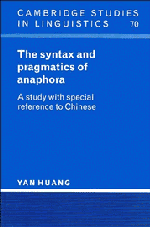Preface
Published online by Cambridge University Press: 23 October 2009
Summary
This book develops a neo-Gricean pragmatic theory of anaphora. In recent years, anaphora has not only become a central issue in linguistic theory, it has also attracted a growing amount of attention from philosophers, psychologists, cognitive scientists and artificial intelligence workers. It has aroused this interest because, on the one hand, some aspects of anaphora have repeatedly been claimed by Chomsky (1981, 1982a, b, 1986a, 1988, 1991b) to reflect underlying principles of innate Universal Grammar (UG), the biologically determined endowment of the human mind; and on the other hand, anaphora has been shown to interact with various syntactic, semantic and pragmatic factors. It has therefore provided a test case for various competing hypotheses concerning the relationship between syntax, semantics and pragmatics in linguistic theory.
Anaphora clearly involves syntactic, semantic and pragmatic factors. Although it is generally acknowledged that pragmatic factors play an important role in discourse anaphora, it is equally widely held (especially among Government and Binding (GB) theorists) that only syntactic and semantic factors are crucial to intrasentential anaphora. This book argues that contrary to this popular but erroneous view, the contribution of pragmatics to anaphora is much more fundamental than has been commonly believed, even at the very heart of intrasentential anaphora. Syntax and pragmatics are interconnected to determine many of the processes of anaphora that are thought to fall within the province of grammar. This approach, of course, does not deny the existence of distinct syntactic, semantic and pragmatic levels and modes of explanation in linguistic theory.
Information
- Type
- Chapter
- Information
- The Syntax and Pragmatics of AnaphoraA Study with Special Reference to Chinese, pp. xiii - xviPublisher: Cambridge University PressPrint publication year: 1994
